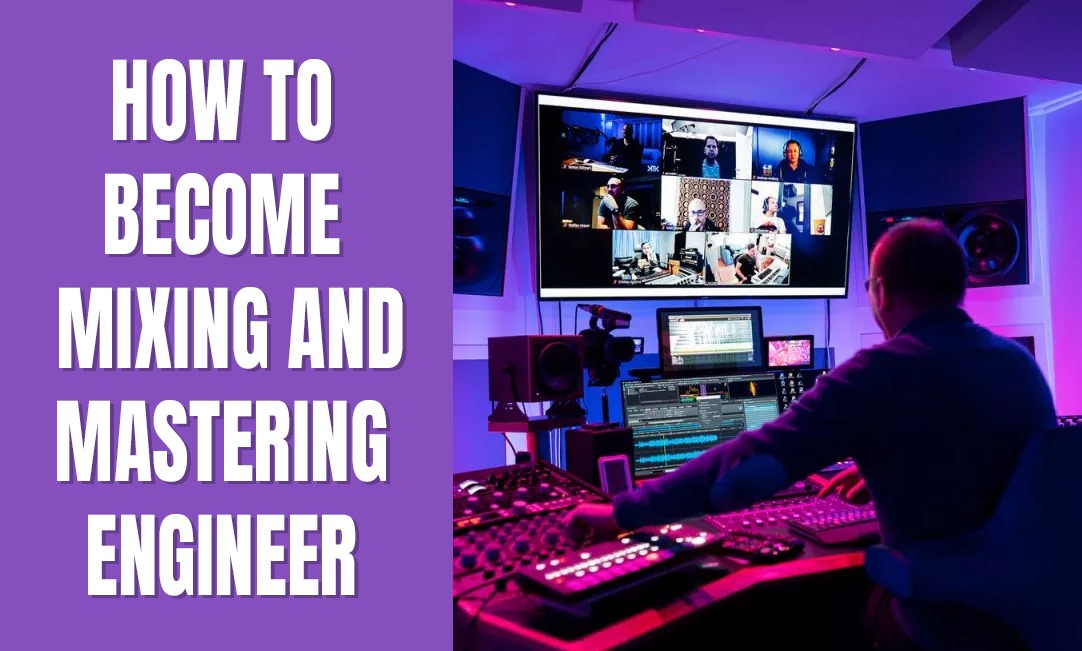A Guide to Becoming a Mixing and Mastering Engineer

8-Aug-2023
There are numerous roles in the dynamic music industry that contribute to the creation of high-quality music. Among these roles, mixing and mastering engineers are critical in ensuring that a recording sounds polished and professional. If you love music and have an ear for detail, becoming a mixing and mastering engineer could be a rewarding career path for you. In this guide, we will go over the steps needed to begin this journey and develop the skills to excel in this field.
1. Understanding Mixing and Mastering
Although mixing and mastering are distinct processes, they are required to produce a cohesive and sonically pleasing final product. Mixing is the process of combining individual tracks from a recording, adjusting levels, panning, and applying effects to create a balanced and immersive sound. Mastering, on the other hand, focuses on enhancing the overall clarity, tonal balance, and dynamic range of the mixed track before it is distributed.
2. Acquiring Technical Knowledge
A solid foundation in audio engineering principles and techniques is required to become a proficient mixing and mastering engineer. Learn about digital audio workstations (DAWs), such as Pro Tools, Logic Pro, and Ableton Live, commonly used in the industry. Learn how to manipulate sound creatively and effectively by understanding signal flow, audio processing, equalization, compression, reverb, and other effects.
3. Developing Critical Listening Skills
Developing acute listening skills is a crucial aspect of becoming a successful audio engineer. Learn to recognize subtle nuances, frequencies, and spatial elements in a mix. Investigate various musical genres to learn about their distinct characteristics and production techniques. Use A/B comparisons to tell the difference between well-mixed and poorly mixed tracks, paying attention to details like balance, clarity, and stereo imaging.
4. Building a Diverse Music Library
Broaden your musical horizons by listening to music from various genres and artists. This exposure will assist you in comprehending different production styles and artistic preferences. Analyze popular songs from different genres and evaluate their sonic qualities. Learn to appreciate various musical elements and how they contribute to the mix.
5. Learning from the Experts
Learning from experienced professionals in the industry is one of the best ways to improve your skills. Attend workshops, seminars, or conferences where world-class mixing and mastering engineers share their knowledge and techniques. Online tutorials, forums, and courses can provide helpful information and resources. Seeking mentorship or interning at a reputable studio can provide hands-on experience and the chance to learn from experienced engineers. You can register in a sound engineering school where you will be trained by experts. In Los Angeles, we have several top sound engineering schools, such as The Los Angeles Recording School, Icon Collective, Thornton School of Music and more that offer several courses for aspiring sound engineers.
6. Building a Portfolio
It is essential to create an impressive portfolio in order to showcase your skills and attract clients. Begin by offering to help friends, local artists, or aspiring music artists. Collaborate on projects to gain hands-on experience and create a diverse body of work. As you progress, update your portfolio with your best mixes and masters, emphasizing your versatility across genres and styles.
7. Networking and Collaboration
Collaboration and networking are essential in the music industry. Use social media, industry events, or online platforms to connect with music artists, producers, and other industry professionals. Joining professional audio engineering institutes or forums can also help you make connections and stay up to date on industry trends. Attend and participate in music festivals, live shows and more to expand your connections and become a successful mixing and mastering engineer.
8. Continuous Learning and Adaptation
Music production technology and techniques are constantly evolving. Keep up with the latest developments in audio engineering, plugins, and gear. To stay ahead of the curve, try out new tools and workflows. Seek feedback from peers and professionals to help you improve your skills.
Conclusion
To become a mixing and mastering engineer, you must have technical knowledge, critical listening skills, and a love of music. You can start a rewarding career in audio engineering by devoting time and effort to developing these skills, honing your craft, and building a strong portfolio. To advance as an engineer, learn, adapt and look for opportunities to collaborate with other professionals. You can become an invaluable asset in the music production process with perseverance and dedication, shaping the sound of the industry for years to come.
MIX Recording Studio, the top recording studio in LA, helps aspiring and seasoned music artists in music production. At our studio, we offer excellent collaborating opportunities where music artists and sound engineers work together to create great music.
Read Similar Blogs:
ESSENTIAL STUDIO GEAR: MUST-HAVES FOR ARTISTS AND ENGINEERS
ELEVATE YOUR SONG MIXES WITH THESE SIMPLE TECHNIQUES